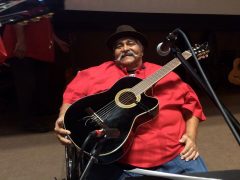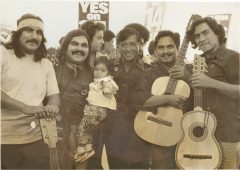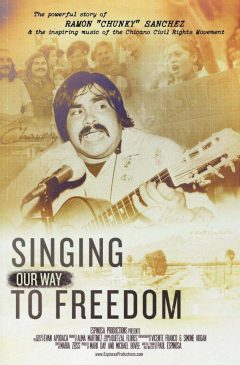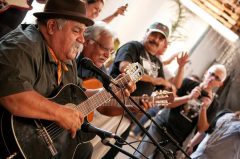Featured Stories
Activist, Musician, Educator: CHUNKY SANCHEZ and Singing Our Way to Freedom
The 1960s and 1970s were tumultuous decades of struggle for many who were seeking civil rights and privileges outlined in the U.S. Constitution. Our great country, though historically better than most other nations in making certain that the status of full-fledged citizens is unmembered, has too often fallen woefully short in protecting the rights of people of color and of women. Despite the assurances made by the Founding Fathers that have been embedded into law, racism, and discrimination persisted; it was merely a matter of time before those feeling the brunt of inequality would speak up, act up, organize and demand the rights promised them.
The history of the last half of the 20th century in America was a complex narrative of struggle, protests, boycotts, marches, a demand by black and brown people, women, and gay and lesbian communities for a better deal, the freedom to be Americans, full empowered in the pursuit of happiness. It was a heady time indeed, passions enflamed, minds focused on the prize. There were marches, chants, raised fists, speeches, confrontations with bosses and police and politicians, and, as we remember, there was music. Music was a means to sooth the savage beast, as an old and brittle adage has it, but song, more important, of focusing the passion, of carrying a message that is melodic, poetic, and unforgettable when the marches were over, and everyone went home. Songs spoke more profoundly to the deeper part of ourselves than rally speeches ever could. We had our troubadours who inspired the protesters, the marchers, the young and old people fighting for a better life, people such as Dylan, Phil Ochs, Joan Baez, and Buffy Saint Marie. Their melodies and tales of injustice and the undying dream of freedom for all were inspirations to the activists that is much discussed, appreciated, celebrated.
In San Diego, the principal struggle I happen to recollect was the Chicano civil rights struggle, and a recent documentary, Singing Our Way to Freedom, written and directed by Paul Espinosa, offers an overdue and fascinating appreciation of the late activist, musician, and songwriter Ramon “Chunky” Sanchez. It also provides a history of the fight of Chicano rights in the area.
Sanchez was born to Mexican-American parents in Blythe, California. Taught to sing traditional Mexican songs by his mother and uncles who played guitar, he became involved in the struggle for civil rights after working for several years alongside his father as an agricultural worker. As he gained more experience and became more confident in his musical ability, Sanchez began composing his own songs in the styles learned with subject matter that often dealt with bicultural identity and the socio-economic reality of being Mexican-American. The documentary highlights his beginnings as a laborer and his growing involvement with the Chicano civil rights movement in San Diego County. In a wealth of intriguing and historic footage, Singing Our Way to Freedom shows the beloved Chunky at the demonstrations in the farm fields, at the rallies, in the parks and during the marches, playing and singing the message of freedom for the cause of creating social change, and overcoming the prejudice and racism that bedeviled the world. The power of his message and his willingness to commit to the struggle for the Mexican-American community that he soon became the favorite musician of Caesar Chavez, leader of the United Farm Workers. He was a student activist while at San Diego State University where he became involved with his community’s demand that an area of public, located under a series of freeway overpasses, be made into Chicano Park. As the film outlines, pressure brought about by community activism was such that the city agreed to dedicate the land as a park. Later, though, the city reneged on its assurances and announced that it would proceed with building a police substation in the area instead. A sense of betrayal was to be expected, and a focused fury from the community, demanding that the city of San Diego honor its promise to turn the land into a park, resulted in plans for the substation being dropped and Chicano Park becoming an actuality, a thriving community space. From this emerged an endearing and enduring anthem composed by Chunky, the “Chicano Park Samba.” His presence in the movement grew national in scope, his biography notes, recording with folk singer/activist Joan Baez on her first Spanish language album. Soon he formed a band, Los Alacranes Mojados (“The Wetback Scorpions”), which became an ubiquitous presence in the effort to spread the message of freedom and the need for equal rights, appearing at rallies, prisons, wedding celebrations, and schools. The film amply demonstrates a performer of wit, subtlety, and a sense of irony, down on the cover of Los Alacranes Mojados’ debut album, featuring a potent photograph of the band members climbing over the border fence, sneaking into the land of their origin and cultural pride, a symbol of a community striving to create a space for themselves. Commentators in the film discuss at some length a larger issue than rights and freedoms for a Mexican-American community, that of making a space in the American dream where a bicultural people could belong. “Pocho,” a song by Sanchez, has the master musician dolefully explaining the psychic plight of Mexican-Americans who felt they were not wanted by either Mexico or America.
One of the ideas that courses through Singing Our Way to Freedom is the ability of music and the musicians who write and perform the songs to infuse audiences with a passion that makes one want to work for a better existence, to inspire the many to exceed their expectations in the quest for justice and equal rights as American citizens. In a phone interview, the film’s writer-producer and director Paul Espinosa speaks on the need for music to make the message personal.
“Music is so important to social movements. We’re very aware of that because of the African-American civil rights movement. The songs were central to keeping people engaged, motivated, and inspired. During awful times when people were beaten and oppressed, music has been an important element in inspiring our hearts and our souls to keep going in the face of adversity.”
Espinosa is a veteran producer for PBS whose past films have earned a total of eight Emmy awards (The Lemon Grove Incident, …and the earth did not swallow them, The Hunt for Pancho Villa, The U.S.-Mexican War). A Ph.D. in anthropology and a professor emeritus at the School of Transborder Studies at Arizona State University, Espinosa developed an interest in creating documentaries concentrating on the US/Mexican border.
Espinosa has an ongoing interest in bringing a scholar’s eye to making films about border and immigration issues. At one point he ventured to Hollywood to learn what he could about film production, a quest that landed him behind the scenes on the set of a hit CBS drama.
There was some urgency to making Singing Our Way to Freedom for the filmmaker, who clearly felt the clock was running out. Espinosa wanted to capture Chunky’s story in the singer-songwriter’s own words. Sanchez passed away October 28, 2016, but not before Espinosa recorded a series of long conversations with him, much of which is used in the documentary.
“I’ve known Chunky since I came to San Diego in the late ’70s and I’ve been involved with producing work on the Latino community and on the U.S. Mexico border region during the really bad times in the late ’70s, early ’80s. I was connected to PBS for a while early in my career but all of the work I’ve done has been basically exploring the border region and the Latino community in one way or another over a long period of time. I’ve known Chunky for more than 40 years and our lives criss crossed for many years. I would meet him at many political rallies and demonstrations. He was in two of my early films. One was a film called the Lemon Grove Incident. He scored music for that film. And he scored the music for another even earlier film called The Trail North. Both films dealt with the Mexican-American community here in San Diego. And I felt that I wanted to have some music that reflected the culture. And so, he did that.”
What comes out of Espinosa’s gathering of archival material and interviews is a warm and fascinating portrait of an important artist/activist who was, until now, a largely unsung presence during an important part of San Diego history. Ramon “Chunky” Sanchez comes across as warm, funny, talented, and committed to a cause greater than himself. Singing Our Way to Freedom that can inspire us to keep our eyes on the prize.
Two screenings of the movie are happening this month. Both will include a panel discussion after the film with the director.
Thursday, April 4, 5pm, at Mira Costa College, 1 Barnard Drive, Oceanside, beginning with a reception featuring music by Los Alacranes.
Tuesday, April 9, 2:30pm at Mesa College, Rm. G-101, 7250 Mesa College Dr.















